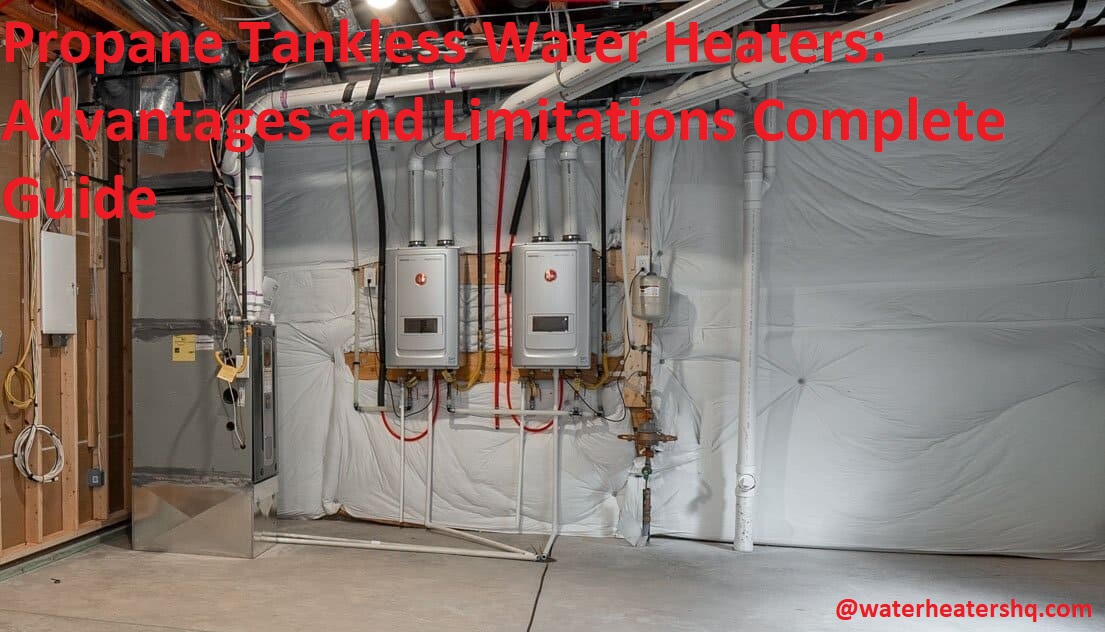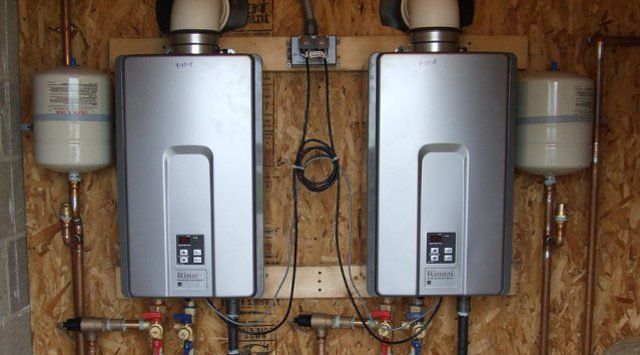Are you tired of waiting for over 10 minutes for hot water to arrive every time you open a shower tap?
Propane tankless water heaters might just solve your problem! Not sure if it is the right choice for you? Read on to learn about its advantages and limitations.
The use of propane tankless water heaters has become a popular choice for homeowners interested in energy efficiency and cost savings. Propane tankless water heaters, also known as demand-type or instantaneous water heaters, use propane to provide an endless supply of hot water. By only heating water when it is needed, rather than having to keep a large tank of hot water stored at all times, these instantaneous systems provide many advantages that traditional hot-water tanks just can’t match.
In this guide we will explore the advantages and limitations of using a propane tankless system to meet your home’s hot-water needs. We will discuss how these on-demand systems work and the range of sizes available on the market today. We’ll also look at their potential fuel savings compared with conventional storage-tank water heaters; how they are affected by incoming cold-water temperatures; their lifespan; different installation options; maintenance requirements; code compliance; and ways to maximize your return on investment from this type of heater. Finally, we’ll look at some other considerations when selecting a tankless system such as current fuel prices and availability in your area. So let’s get started!
Explanation of propane tankless water heaters
Propane tankless water heaters are a cost-efficient solution for providing hot water to both residential and commercial applications. Tankless or “on demand” water heaters only heat the water as it is used, lower energy costs, and are able to provide a continuous supply of hot water. Unlike conventional tanked water heaters, which keep stored hot water in a storage tank and only supply it when needed, a propane tankless heater turns on immediately when you turn on the tap, offering endless hot water.
Propane tankless models usually feature high-efficiency designs due to their excellent energy management capabilities. This helps reduce operational costs over time while also ensuring an environmentally conscious operation. Additionally, they are typically a space-saving design due to their wall-hung installation process. This eliminates the need for bulky floor tanks and may be preferable in areas with limited space.

Importance of understanding advantages and limitations
Understanding the advantages and limitations of propane tankless water heaters is critical when making the decision to purchase one. Propane tankless water heaters are gaining popularity due to their cost savings, energy efficiency, and convenience. Propane tankless hot water heaters generate hot water on demand and require less storage space than traditional storage tanks. They also provide a steady supply of hot water for multiple fixtures simultaneously for increased comfort.
Propane tankless systems also offer financial savings because they typically cost less to operate than conventional storage tanks. When considering a propane tankless heater, however, it’s important to understand its limitations – in terms of fuel requirements, size of space it can be used in and its maximum flow rate capacity. These limitations must be taken into account when selecting a system and evaluating the type of fuel required by the heater. In some cases the type of fuel may need to be changed or modified accordingly, in order to make sure that the most efficient choice is made depending on each individual installation setup.
In addition, when using propane tankless systems it is important to consider the safety requirements such as proper ventilation for proper operation and maintenance that must be followed in order for them to work safely and reliably.
Advantages of Propane Tankless Water Heaters
Tankless water heaters offer a number of advantages over their traditional tank counterparts, which make them an attractive room to consider for some households. Some of the most significant benefits of installing and using a propane tankless water heater include:
- Unlimited hot water – when the water supply is turned on without restrictions, endless hot water can be supplied; this means that homeowners can take as many showers or baths as they wish without running out of hot water.
- More energy efficiency – because a tankless hot water system only heats and supplies hot water as it is required rather than constantly running to heat up a tank full of heated stored-up water, a propane tankless system can provide savings in monthly bills over its long life expectancy, which may exceed 20 years or more.
- Small size – these systems are normally about the size of a standard suitcase and hang on the wall in an accessible location near where it is needed so only minimal floor space is taken up with its installation and it’s easier to service should maintenance be required by the installer if faults are detected by electronic scans at either end; this also makes it possible to install in locations where it wouldn’t be practical to fit other types of storage tanks.
- Installation flexibility – because tankless systems don’t need access to large amounts of space for storage tanks they can normally easily be installed anywhere convenient such as attics, basements, closets or garages with minimum disruption to normal household layout and environmental conditions; this makes them ideal for off-grid applications such as cabins and other retreats away from mains electricity supply connections where absence could make living dangerously uncomfortable due to extreme weather conditions etc…
Energy efficiency
Propane tankless water heaters have become increasingly popular as an energy efficient, high-performance and cost effective solution for commercial and residential hot water needs. Propane, or liquefied petroleum gas, is a clean burning fuel, making it the perfect choice for many homes.
Propane tankless water heaters work by heating a stream of water as it passes through the device. This provides an unlimited supply of hot water on demand without any need for storing the heated water in a tank. Since hot water is only produced as demanded and does not require large amounts of energy to be sits in reserve, propane tankless water heaters conserve energy immensely over regular storage-style tanks.
The efficiency of propane tankless systems is typically measured by their Energy Factor (EF), which takes into account the amount of energy required to produce a certain level of warmth, in British Thermal Units (BTUs). Propane fired units typically operate with more than 90 percent efficiency ratings compared to traditional electric stands that may achieve an 80 percent rating or lower.
Propane fired tankless systems also provide superior space saving benefits due to their smaller size when compared to bulky storage tanks. Additionally, these units can be conveniently located outdoors decreasing the overall need for indoor space that’s usually taken up by such devices . This can be especially beneficial if your home or business already lack enough space to store extra plumbing equipment or furniture. By providing convenient access to unlimited hot water and extremely high levels of energy efficiency all with minimal design requirements, propane-fired tankless systems are perfect for those who are looking for cost savings options both long and short terms!
Explanation of energy efficiency
Propane tankless water heaters offer a significant advantage in energy efficiency compared to older models. Traditional storage tank water heaters, with their large tanks of hot water, must maintain and reheat the water regularly in order to keep it hot and ready any moment you need it. This process takes a lot of energy, which can be reflected in your monthly utility bills.
On the other hand, propane tankless water heaters supply only the amount of hot water needed at that time and don’t reheat continuously. This allows them to use significantly less energy, also resulting in lower energy costs. In fact, they can reduce your energy usage by 40% or more each month compared to a traditional storage tank model. Additionally, because these models don’t require a pilot light like some older models do, your bills will be even lower as you eliminate this extra wasted energy expenditure.
Comparison with traditional water heaters
Traditional water heaters, while still a viable option, are on their way out of the market due to their numerous drawbacks. On the other hand, tankless water heaters are more energy-efficient and can save you money in the long run. In comparison to traditional tanks, tankless water heaters do not waste energy to keep a constantly heated reservoir of water in your storage tank for long periods of time; this generally results in about 30 percent savings on your monthly utility bill.
Additionally, you never need to worry about running out of hot water or having low pressure as these units respond quickly and effectively to temperature needs when turned on. Most tankless models feature digital display control panels that let you control temperature and power settings with ease, equipping you with all the control you need for your comfort level.
Furthermore, most traditional storage tanks tend to become rusty over time due to the constant heating cycles; however this is not the case for these tankless variants as they are comparatively more durable and have longer lifespans due to their design.
Moreover, tankless systems can be installed almost anywhere as they offer various features such as wall-mounting which makes them very space efficient. However, one downside is that these units may require some updations or installations (depending on your existing plumbing systems) by a certified plumber which could lead it having slightly high installation cost.

Factors to Consider When Choosing Propane Tankless Water Heaters
Choosing the right propane tankless water heater requires research and understanding of the product benefits and limitations. Certain factors should be taken into account before making a decision to purchase. These factors include but are not limited to: fuel type availability, required venting system, water temperature requirements, household capacity and usage needs, space requirements of the unit, local climate and weather conditions that affect operation, energy efficiency ratings and cost savings potential.
Fuel Type Availability – Propane tankless water heaters can use either natural gas or liquid propane (LP) fuel sources. Some models are approved only for one type of fuel while others can use both natural gas and LP depending on the model. Understanding what fuel option is available in your area will determine if a tankless heater is most appropriate for your home or business.
Venting System – Propane tankless water heaters require adequate venting to meet certain standards set by manufacturers as well as local codes or laws. Gas powered models require a metal B-vent systems whereas LP powered units require traditional chimney flue systems or newer power vent systems which contain electronic fans to send exhaust out through sidewalls or roofs instead of through masonry chimneys.
Water Temperature Requirements – A tankless unit must have enough BTUs (British Thermal Units) to provide sufficient hot water output for all applications during peak consumption periods; otherwise it will not be able to withstand regular demand from multiple outlets/faucets running simultaneously throughout a residence or business. Depending on your needs, heating elements with varying BTU’s are available for purchase based on your geographic area’s climate and average seasonal temperatures.
Size and capacity
Propane tankless water heaters vary in terms of size and capacity. It is important to properly calculate the demand for hot water within your household or business before selecting a heater.
Depending on the size of your space and the number of users, you may need a larger capacity propane tankless water heater that can provide an adequate supply of hot water to your entire home or business. Additionally, these types of heaters are able to take up far less space, allowing for more efficient use of room.
The size and capacity are also important factors in determining how much energy (and cost) it will take to run the heater, so it is important to chose a size that is large enough but not too big that it wastes energy needlessly.
Explanation of size and capacity
Propane tankless water heaters are becoming increasingly popular for both commercial and residential use. These devices take up far less space than traditional water tanks, requiring just a small area to fit the unit itself. They can also provide energy savings of up to 55%. However, before investing in a propane tankless water heater, it is important to understand their capacity and how they work.
Propane tankless water heaters come in two models: point-of-use (or ‘on demand’) and whole house models. Point-of-use models are intended for single applications such as a kitchen sink or bathroom shower, while whole house units are designed to provide hot water on demand throughout an entire residence.
Capacity is an important consideration when selecting a propane tankless water heater, as it determines the rate of hot water you can expect from it. Propane tankless systems have higher flow rates than electric versions, so you may need a larger capacity depending on your needs. Additionally, propane tankless systems generally require more power than electric ones due to their higher power output per square foot of space. Before investing in a system, be sure the brand and model you select can meet all of your needs for hot water supply throughout your home or business premises.
Factors that determine size and capacity
Before deciding on the size of your propane tankless water heater, you need to consider the various factors that will determine the heater’s size and capacity. Location, hot water usage patterns, incoming water temperature, desired output temperature and climate are some of the important parameters that determine the right size and capacity your propane tankless water heater should be.
Location is one of the most important aspects that can help you choose the best size for a propane tankless water heater. This is because location affects both incoming and outgoing water temperature alike. Aspects like elevation can affect your incoming water heat levels significantly. A cooler area will require a higher capacity unit to heat up cold temperatures more rapidly as compared to warmer areas where less capacity would suffice.
Hot water usage patterns over time drastically changes with varying amounts of people using different fixtures at different times of day or night. For example, if you have teenager in your home or live in an area where people generally are known to have long showers, you would need a higher capacity than what would otherwise be required for ordinary household hot-water usage patterns.
Incoming water temperature greatly affects how much heat needs to be added before it reaches your desired output temperature. There could also be significant variation due to outdoor weather conditions or geological features like high altitudes which lead to cold-water entry points for propane units located in some regions across North America. Propane tankless units situated closer than usual 40′ line sets will also require higher BTU input heats due to more energy losses due decreased distances covering while traveling up through hot water supply lines from destination point’s respective tanks – located far apart from each other under certain local geographical settings; mostly found around colder or higher altitude climates.
If you intend use multiple fixtures with hot showers simultaneously then larger sized propane unit rated at highest capacities might make sense otherwise there could cause pressure drops leading longer wait times for tank heating between turning on-off hot buy periods before getting required steady stream flow out faucet taps if smaller sized units are used over lengthy periods – primarily during winter months when shorter days occur when comparison shopping tanks is typically done leading down eventually choosing smaller sized comparatively cheaper models having less BTU ratings/outputs/flow rates than what needed match how best better serve persons’ variable comfort levels catered by perfect sizes suited per matched clients’ requirements solely served correct manner.

Conclusion
In conclusion, propane tankless water heaters are an efficient and cost effective natural gas-powered solution for providing hot water around the clock. They heat water as needed with little to no waste and can offer a return on investment depending on your individual needs.
However, it is important to understand the advantages and limitations of these appliances when making a purchase decision. Propane tankless water heaters are typically more expensive than conventional models, require additional venting components, and have energy efficiency ratings that vary between models and manufacturers. Therefore, it is essential to consider all the factors when determining what system would be best for your home or business.
Ultimately, these appliances can offer significant long-term savings if implemented correctly.
FAQ’S
What are the advantages and disadvantages of a tankless water heater?
Advantages of a tankless water heater include energy efficiency, longer lifespan, and space-saving design. Disadvantages can include higher upfront cost, limited hot water output, and potential maintenance issues.
Is propane tankless water heater better?
A propane tankless water heater can be a good option in areas where natural gas is not available, but it may have higher operating costs compared to a natural gas tankless water heater.
What is the advantage of a tankless gas water heater?
The main advantage of a tankless gas water heater is energy efficiency, which can result in lower energy bills over time compared to a traditional tank-style gas water heater.
What is considered the biggest advantage of a tankless water heater?
The biggest advantage of a tankless water heater is energy efficiency, as it only heats water when it is needed instead of constantly keeping a large tank of water hot.
What is the disadvantage of a tankless water heater?
The main disadvantage of a tankless water heater is the limited hot water output, which may not be sufficient for larger households or simultaneous hot water needs.
What are the limits of a tankless water heater?
The limits of a tankless water heater include the maximum hot water output, which is determined by the unit’s flow rate and temperature rise capabilities.
How much propane does a tankless water heater use?
The amount of propane a tankless water heater uses depends on its size and usage patterns, but it generally uses less propane than a tank-style water heater.
Why not use tankless water heater?
A tankless water heater may not be the best option for households with high hot water demand or where multiple hot water needs occur simultaneously, as it may not provide enough hot water.
Do tankless water heaters need maintenance?
Yes, tankless water heaters require regular maintenance to ensure proper operation and prevent buildup of mineral deposits.
Are tankless water heaters more maintenance?
Tankless water heaters may require more maintenance compared to traditional tank-style water heaters due to the need for regular cleaning and descaling to prevent mineral buildup.
See Also:
- Best power vent water heater
- Best propane tankless water heater
- Best solar water heater
- Best tankless water heater
- Best under sink water heater


